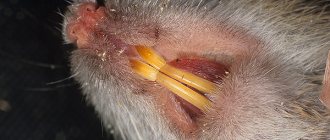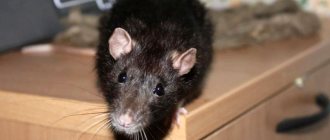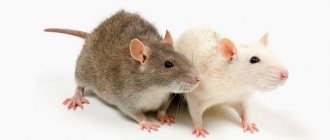- home
- Rat
- Care
06/24/2019 Domestic rats are simple pets that do not cause many problems if well kept and given proper attention from the owner. Healthy rodents are not aggressive and friendly. Therefore, if a rat bites you, you don’t immediately panic – perhaps this is an isolated incident that occurred due to a number of specific reasons. If your pet bites often, you need to find out what motivates this action and what to do.
Main causes of pet bites
Wild and domesticated rats have completely different motivations for biting. For rodents of the first group, any person is a dangerous adversary. Their behavior is subordinated to precisely this attitude, which encourages them to use their sharp teeth.
Domesticated rats are initially peaceful. They are smart, easy to train, and love their owner. The wild instincts of these rodents rarely manifest themselves only in relation to relatives, and then only in conflict situations. Therefore, if a domestic rat has bitten a person, it is imperative to find out the cause of such an extraordinary event in order to prevent its recurrence in the future.
Most often, rat bites occur after:
- causing pain to an animal;
- fright;
- fasting;
- stressful situation.
Quite often, animal breeders note that a rat has bitten a person after the animal was ignored for a long time by the owner. You can’t explain to your pet that you don’t have enough time for daily activities with him. For a rat, lack of attention and communication with a person means almost punishment and causes a negative reaction.
It is necessary to distinguish when an animal bites seriously, drawing blood, and when it simply bites to express dissatisfaction. Such warning bites are typical for domestic rodents. In this way, the animals make it clear that human actions are approaching a dangerous line. For example, this happens when the animal is squeezed too tightly in the palms or is not released from the hands for a long time.
Many pet owners make mistakes when dealing with rodents and overlook the fact that they are setting a bad example for their children. Most cases where a rat has bitten a child are based precisely on copying errors or on insufficient awareness of children. Before buying a rodent, you need to tell your child about the rules for handling the animal.
Sometimes a domestic rat bites because of the strong smell of food from human hands - it confuses the palm with a treat. One of the basic rules for rodent breeders is to thoroughly wash your hands before handling your pets.
It is not uncommon for other pets to be bitten. The causes of rodent aggression in such situations are:
- protecting your site;
- fear;
- the provoking smell of a stranger.
The injured pet must be treated immediately with hydrogen peroxide or chlorhexidine (do not rub, just blot). Such bites usually take a long time to heal. If after 10–12 hours the “wounded” person’s appetite worsens, lethargy and irritability appear, the rodent and the victim must be shown to a doctor.
Posts 1 page 22 of 22
Share12010-05-25 12:38:15
- Author: Voice.
- Participant
- From: Kyiv
- Registered: 2009-08-17
- Invitations: 0
- Posts: 59
- Female gender
- Age: 38 [1982-11-10]
- Time spent on the forum: 2 days 11 hours
- Last visit: 2013-11-26 13:35:17
I got a new little rat. He is trusting, sociable, active, loves to eat - just a real rat
The problem is that he plays with my hand: he jumps on it, grabs it with his paws and bites. He doesn’t bite hard, not to the point of drawing blood, he just presses with his teeth, but it’s noticeable. I read on forums that sometimes rats play with their hands like this, but this is the first time for me.
Please tell me, is it worth letting a baby rat bite like that? I’m not in pain or sorry, I’m worried that when he grows up, he will express his emotions through biting. And a bite from an adult rat is no longer a joke.
This happened with the cat: at first it was funny - the kitten plays and bites, but now she doesn’t know how to express dissatisfaction in any other way, so I want legs/arms that are always bitten.
Share22010-05-25 12:45:05
- Author: nikta
- Participant
- From: Donetsk
- Registered: 2009-08-26
- Invitations: 0
- Posts: 11840
- Female gender
- Spent on the forum: 2 months 29 days
- Last visit: 2021-07-27 17:07:52
Try turning him over on his back in the game. This is how you show that you are dominant and stronger than him. Well, biting a dominant is more expensive for itself; an animal with a clear hierarchy will not even think about it. And it would be nice to show the baby.
Share32010-05-25 13:04:48
- Author: Voice.
- Participant
- From: Kyiv
- Registered: 2009-08-17
- Invitations: 0
- Posts: 59
- Female gender
- Age: 38 [1982-11-10]
- Time spent on the forum: 2 days 11 hours
- Last visit: 2013-11-26 13:35:17
I turned it over and gently pinched the belly
In response, when he freed himself, he jumped onto my hand and grabbed me with his teeth.
That is, it turns out that this minor miracle is already aiming for dominance. On the first day in the new house. How lovely! I have long dreamed of having a real dominant in my herd! The place is currently vacant.
Should I stop such games altogether so that he respects me, or should I reciprocate by turning him over on his back?
Share42010-05-25 13:12:24
- Author: nikta
- Participant
- From: Donetsk
- Registered: 2009-08-26
- Invitations: 0
- Posts: 11840
- Female gender
- Spent on the forum: 2 months 29 days
- Last visit: 2021-07-27 17:07:52
Well, actually, I’m not an expert in taming rat-dominants, but it seems to me that it’s better to turn him over in response. By stopping the game, you seem to leave the last word with him, and by turning over you explain that the main rat in the house is you.
Edited by nikta (2010-05-25 13:12:52)
Share52010-05-25 13:38:26
My late Bambi was like this - so I weaned him not so much by turning him over, but after each bite, I grabbed him in my hand, brought him to my face and reprimanded him for a long time, uttering the word “impossible” many times (this is my magic word for all my guys), sometimes She grabbed his paw with her teeth so that she could feel what it was like. Rats understand our speech very well, it seems to me, not only intonation, but also some frequently repeated words, so that only then he remembered the old habit, immediately heard a familiar prohibition and calmed down.
Share62010-05-25 14:10:42
- Author: Khabibi
- Participant
- From: Simferopol
- Registered: 2010-05-12
- Invitations: 0
- Posts: 751
- Female gender
- Age: 35 [1986-01-01]
- Time spent on the forum: 15 days 12 hours
- Last visit: 2016-05-13 19:57:24
My first rat also bit my hands, I also fought the biting by turning over or raising my voice! And as an adult, she did not allow herself serious biting, only light nipping that you didn’t feel. The new little one is trying to do the same thing, but I don't think she'll grow up to be a biting monster!
Reasons for aggressiveness of rat pups
There are frequent cases of aggression on the part of young animals, teenage rats. Such animals sometimes behave like wild ones, are frightened by the approach of people, and often huddle in a house inside a cage. It is dangerous to handle such animals.
The causes of aggressiveness in young animals are often:
- lack of attention and education on the part of the breeder;
- hereditary predisposition;
- rough treatment of animals;
- mistakes that were made by the owner.
If you do not pay enough attention to a decorative rat, the animal grows unpredictable. But these animals need very little: to be held correctly, not to cause pain, to play from time to time, to be treated to something tasty. It is also worth remembering that even the most well-mannered rat can bite its owner if he pushes food between the bars of the cage with his fingers. The animal will easily confuse your fingers with a treat.
Important! It has been established that rodents infected with a viral infection lose fear and their desire to hide from strangers disappears. Such animals are aggressive and very dangerous.
Pain
Like most other mammals and rodents in particular, a rat can bite when it experiences a sudden attack of pain. An accident could theoretically happen anywhere - during play and even inside the cage. Such a bite should be regarded as a defensive reaction.
If a hitherto calm animal suddenly begins to bite, there may be something wrong with its health, it is better to show it to a veterinarian. It is necessary to either immediately exclude the competence of veterinary medicine or begin treatment on time.
Why did the rat suddenly start biting?
When asked whether domestic rats bite, zoologists and veterinarians answer positively. It all depends on the circumstances and the physical condition of the animal. It happens that visually imperceptible fluctuations in hormonal levels in the body of a domestic rat cause mood swings in the animal and lead to aggression. In males (in most cases) this is associated with puberty, in females - with the onset of pregnancy.
Each rodent grows differently. There are pets whose emotional amplitude is very small. They are distinguished by their even and calm behavior even during puberty. There are other animals: in some males, closer to 7 months, the character changes dramatically. The previously playful and sociable animal begins to strive for solitude, defend its right to the inviolability of personal territory, and bite.
In females, hormonal surges are observed during pregnancy and caring for the young. Rats are tender mothers; they guard their newborn babies day and night. In such a situation, even a slight danger or anxiety can serve as a motivating motive for the rat to bite.
Interesting! If a rat released for a walk is aggressive (the fur on the back of the neck is raised, the ears are flattened), it may well bite. In such a situation, there is no need to make sharp gestures.
Signs of an attack
You can see what a rat bite looks like in the photo below. Features you should pay attention to.
Many people know what a rat looks like. Rodents have two types of teeth. They are all unusually sharp. Particularly dangerous lower long incisors. Animals use them to chew through durable structures made of wood, brick, and concrete. It is not difficult to bite through human skin. The long incisors from above and below dig in with a death grip, inflicting deep wounds, as a result of which blood flows heavily.
First aid for a bite
If bitten by a rat, the person needs urgent help. As a rule, the wound is deep and painful. Its peculiarity is the high rate of cell regeneration at the edges and low in the center. This causes a characteristic clinical picture: the blood along the perimeter of the deformation of the epidermis quickly stops. This situation increases the chances of human infection if the animal has been infected.
Any owner of a pet rat should know what to do in this case, how to help himself at home:
- Apply light pressure to the wound to release blood.
- Rinse the rat bite. Hold the wound under running water for 5–6 minutes.
- Apply any antiseptic (hydrogen peroxide, chlorhexidine) to the bite area.
- Treat the affected area with iodine or brilliant green.
- Place a small swab on the wound and secure with adhesive tape.
After the treatment, you should pay attention to changes in well-being and monitor your health over the next 4–5 days. It is better not to wet the bite site; wash dishes with gloves.
Important! The rate of healing of a wound after a rat bite depends on the health of the animal (at the time of the attack), whether it has mandatory vaccinations, and the quality of keeping the pet in the cage. If the rat's home is not cleaned regularly, there is a high risk of infection in the wound.
Treatment
If the bite leads to rabies, the victim needs emergency vaccination. Now they are given not in the stomach (30 injections), but in the shoulder - 5-6 vaccinations. The first must be done on the day of the attack.
Subsequent ones - on days 3, 7, 14, 30 and 90. If you complete a full course of vaccination, then even after a person is bitten by a rabid rat, he can save his life.
Bites localized to the head or face are especially dangerous . If the wound is too deep, you will need to administer antibacterial agents and use drainage. Or you have to get stitches.
Can a person get sick after being bitten by a pet rat?
Rodents have long been considered carriers of diseases, the most dangerous of which are leptospirosis, tetanus and sodoku. If an animal is sick with leptospirosis, for a person this is fraught with the development of paralysis, myocarditis, renal failure, and infectious-toxic shock. The bite in this case is completely optional; it is enough to finish the bread that was bitten by the sick animal.
According to research, 10% of people who become infected with sodoku after being bitten by a rat die. In case of infection with tetanus, the number of deaths increases to 30%. This disease is also dangerous due to its complications on the heart and lungs.
Most rodent owners take bites lightly. Just think, a rat bit your finger, don’t make a tragedy out of it. Meanwhile, even a not too strong bite from a domestic rodent can have serious consequences.
At first, there are no visible changes in a person’s well-being. This can continue for about 14–16 days. But if infection does occur, after 2 weeks the rat owner will feel that he has:
- the temperature has risen;
- chills appeared;
- weakness throughout the body;
- loss of appetite;
- I have a stomachache;
- diarrhea and vomiting began;
- the bite site is festered and hurts;
- spontaneous muscle contractions appeared;
- sleep was disturbed.
If you have even 3-4 of the listed signs, you should immediately consult a doctor. He will definitely ask you to name the exact date of the bite.
Important! If a rat has bitten a child or adult, and the animal’s behavior is alarming, you should see a doctor as soon as possible.
According to statistics, domestic rodents are rarely carriers of infectious pathologies. However, when purchasing a furry pet, you should definitely ask the seller to provide veterinary certificates and a license. This will reduce the chances of introducing a sick rodent into the family.
Complications
The consequences of rat bites and what needs to be done to avoid serious health problems depend on the characteristics of the person. Each body reacts to bites individually. If there is no infection, the painful symptoms disappear gradually, the wound heals every day.
Dangerous symptoms appear 3 days after the incident:
- the bite site becomes inflamed, pain, swelling appears, and purulent discharge begins;
- body temperature rises to a variety of values;
- chills, malaise, weakness appear;
- severe periodic or constant pain in the head;
- Intestinal upset is observed, nausea and vomiting appear.
Trying to get rid of painful symptoms on your own in this case is undesirable. A complete examination is necessary to prevent a sad outcome and terrible complications.
If a rat has bitten a small child, it is necessary to treat the wound and see a pediatrician as soon as possible. You will have to get a vaccine against tetanus and some other diseases.
How to stop a rat from biting
If an animal has bitten its relatives or other pets, you should seriously think about the reasons for the rodent’s nervousness. Sometimes it can be:
- lack of water, food;
- lack of shelter in the cage for quiet rest;
- regular “torment” at the hands of people;
- disease.
Until the cause is determined, the animal should be placed in a separate cage for 10 days. If no illness has been identified, and the rodent does not lack communication and care, perhaps the bites were triggered by random stress or hormonal fluctuations.
Sometimes an animal bites out of habit, which was developed due to improper communication with it during the period of adaptation to a new place. This situation dictates the need to wean the rat from biting and to tame the pet again.
This process is best started by changing the cage. A new environment, fresh impressions and smells will help the animal change its behavior. The dwelling should be placed in a quiet corner of the room, dim lighting should be created, and a small “hole” should be built inside so that the rat can rest there from unnecessary attention and sleep peacefully.
For the first few days, the rodent is left alone. As soon as the animal begins to spend most of its time outside the burrow, you can begin to communicate with it. Rat training should be done regularly, but not for too long. It is important to observe the rodent, determine its inclinations, and not cause pain.
If you try to bite, you should stop communicating. The animal will quickly understand that it is doing the wrong thing. Usually 1–2 months are enough to wean a rodent from a bad habit.
Steps to Taming a Baby Rat
The rat is tamed in stages:
- At the first stage, teach your pet to approach the cage door to get a treat. This is necessary so that when you need the animal to come to the door, and you don’t have to chase it throughout the cage. Shake the bowl of treats, the rat will perk up and may come to the door. If this does not happen, try to lure it to the door by bringing a tasty morsel under the animal’s nose. You can train her to respond not to the sound of a treat, but to the pronunciation of the pet’s name. To do this, say his name every time before offering a treat. He will get used to his name.
When offering a treat, lure your pet into your palm. Taking pieces of treats in your hand, stick your palm with them into the open door. When the little rat takes one piece and starts eating, you need to make sure that he has to leave the cage for the next one. The rat will gradually begin to follow the hand with the treat. Gradually move your hand away every day so that at one moment it has to feast on a piece, climbing into your palm.
Allow the rat to move around outside the cage. If a curious animal wants to get out of the cage and explore the surrounding area, then do not forbid him to do so. Perhaps she will want to eat a treat from your hands and will come up to you for this. Let him eat. In addition, your pet can climb on your clothing; do not make sudden movements. She must trust you. Keep the door to the cage open, the pet will decide when to hide there. This is his shelter and it should be as safe as possible.
A rat that is accustomed to you can already be picked up. Choose a convenient opportunity for this and carefully lure her into a corner. Don't scare the animal. Say kind words to him and stroke him. After picking up the baby, give him a treat and quickly return him to the floor. The rat should not scream or be afraid; only a slight squeak is allowed.
Try to hold the rat in your hands until it calms down. Although this is difficult to do with temperamental individuals, release your pet to the ground only when he calms down in your arms. Try to do this immediately after he stops resisting. In the future, gradually increase the time he spends in your arms.
The rat must be picked up constantly. It's good when you do this every day, at least for twenty minutes, the best time for this is the middle of the day. Do not stop your pet from exploring your body and sniffing you, the main thing is that she spends this period of time in your arms. At first she may try to escape from your hands, squeak and resist, do not allow this to happen. To avoid rat bites, you can first pick up the animal with a towel.
Play with your pet. When he becomes interested in being with you, and he himself asks to be held in your arms, you can arrange a playground using various devices. Just remember, teach each new toy separately so as not to frighten or tire the rat. And the more time you devote to her, the stronger the connection she will have with you.
What to do if rats bite each other
Sometimes light rodent bites are a sign of affection, a way to attract attention. The favorite game of domestic rats with each other is biting the ear and running to the side. Then the animal returns to the object of its attention and repeats everything again. If the rats are playing, there is nothing to worry about.
It’s another matter when a domestic rat bites its fellow rat until it bleeds. As a rule, this is accompanied by a bellicose snort and squeak. In such a situation, it is necessary to separate the fighters and put the instigator in a separate cage. This is done using thick gloves.
Often rodents bite as a means of communication. In this way, rats confirm their own dominance and claim territory. When it comes to fighting, the participants need to be isolated from each other for 6-8 days. If after this they continue to conflict in a common cage, the only way out is to move the rodents into different homes forever.
Interesting! If a rat lightly nibbles a pet of another species (for example, a cat) with its teeth, this is a sign of care and a positive disposition of the animal towards its great friend. There is no need to worry about imaginary aggression in this case.
When buying a decorative rat, you should be aware of the need to take the furry rodent seriously. If you do not take into account the conditions under which a domestic animal can attack a person, most likely not only the owners will be bitten, but also people around them, such as children. Conversely, if you have information about the motives for a possible attack by domestic rats, you can organize comfortable living conditions for your family and tailed pets.
Redirected aggression
If two rats divide spheres of influence and find out which of them is in charge, you risk becoming a victim of redirected (indirect) aggression. Don't get caught between warring rats and don't take the bite personally: as they say, it was nothing personal. Soon everything will be forgotten, no complaints against you.
If you nevertheless decide to take on the duties of a referee and want to separate the fighters, then you need to prepare thoroughly. First of all, protect your hand by wrapping it in a thick cloth. Second, splash water on your pets. If you were bitten, take it for granted.
Danger
Even shallow rat bites can be deadly. Rodents spread more than 60 pathogenic microorganisms, carry helminth eggs, and are carriers of dangerous diseases. When they bite, rats secrete saliva that contains viruses, bacteria, and other infections.
- Licorice. Or rat bite disease. Sad statistics show that if no measures are taken, 10% of cases end in death.
- Tetanus. People are vaccinated against this disease in childhood. This is enough to protect an adult from a dangerous infection. If vaccination has not been done, the risk of developing tetanus increases significantly. Complications of the disease are pneumonia, heart paralysis, blood poisoning. The fatality rate is quite high - about 23%.
- Leptospirosis. It is very often transmitted by the bite of a rat. In most cases, the patient ends up in intensive care. Complications are kidney failure, cardiac paralysis, anaphylactic shock, death.
- Pseudotuberculosis. Affects the respiratory organs and lungs. The danger is the development of pleurisy, myocarditis, and meningitis.
- Listeriosis. The causative agents of infectious diseases are pathogenic microorganisms. The risk of developing pathology increases in people with low immunity, children, and pregnant women. In pregnant women, it provokes miscarriage at any time.
- Toxoplasmosis. Infectious bacterial disease affecting the intestines. With a significant proliferation of pathological microflora, other internal organs are affected.
- Q fever. The disease is characterized by fever, chills, and severe intoxication. Dangerous complications that can affect any internal organs.











